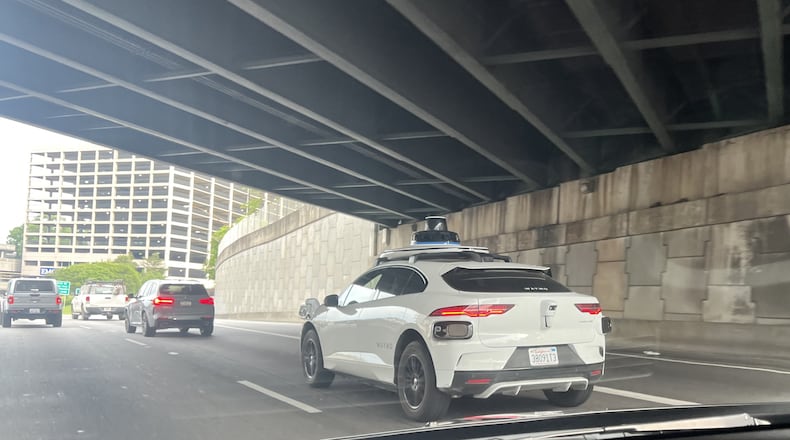Self-driving car company Waymo is testing its vehicle technology in Atlanta, but the ride-hailing service isn’t ready to take customers for rides here just yet.
Waymo announced Tuesday that it is taking its Waymo Driver autonomous driving system to Atlanta, as it evaluates how the technology “generalizes to different environments and new experiences.”
A Waymo vehicle could be seen driving on the Downtown Connector Wednesday morning, with a person sitting in the driver’s seat.
Waymo said it will have a handful of cars in Atlanta for testing over the next few months, driving manually at first and then moving to autonomous testing with a human driver behind the wheel, according to an e-mail from Waymo spokesperson Sandy Karp-Beller.
The vehicles will initially be driving “at all hours of the day, in various neighborhoods around Atlanta, including, Downtown, Georgia Tech, the Westside, Midtown, Piedmont Heights, and Virginia Highland,” according to Karp-Beller. The company says its testing fleets are “limited and closed to the public.”
In a post on its website, Waymo said it takes the autonomous driving system “on road trips to regions where the driving culture and conditions differ from the areas we regularly operate.”
It’s yet to be seen what lessons Waymo may learn from the “driving culture” in Atlanta.
The Mountain View, California-based company started as Google’s self-driving car project in 2009, which the tech giant spun off as an independent subsidiary of Alphabet, Google’s parent company, in 2016.
Credit: TNS
Credit: TNS
In 2017, the company started testing autonomous taxi services in Phoenix and it now has autonomous ride-hailing services in San Francisco, Los Angeles, Austin and the Phoenix area. It said it is testing the Waymo Driver system “in parallel.”
Waymo is “not yet launching a rider program in Atlanta,” according to Karp-Beller, instead focusing on growing in the cities where it already operates.
But autonomous vehicle companies testing their technology on city streets can raise safety concerns.
In February this year, Waymo voluntarily recalled a previous version of its self-driving software after two of its vehicles hit a pickup truck that was being towed. In May of last year, a Waymo vehicle hit and killed a small dog in San Francisco that ran into the street in front of the car, according to a report the company filed with the California Department of Motor Vehicles.
There have also been incidents with self-driving cars involving injuries to people. Last October, a woman who was the victim of a hit and run by a human driver that launched her into the path of a self-driving car was then dragged by the autonomous vehicle, operated by General Motors’ Cruise division. The woman was seriously injured and California subsequently suspended Cruise’s driverless permits.
According to the Georgia Department of Transportation, there is no rule or law that mandates that Waymo tell the state when or where they are testing.
The company said it notifies communities, government stakeholders and riders in locations where it brings the system for testing.
Waymo’s head of corporate and strategic finance, Pragav Jain, wrote in a LinkedIn post: “We’re happy Georgians are excited to see us as well!” He cited a quote from Gov. Brian Kemp welcoming Waymo as part of a growing list of “industries that provide the jobs of tomorrow.”
By adding to the system’s experience, it will “eventually have fewer novel situations that we’ll have to teach the Driver to navigate,” according to Waymo. “For example, our rain testing in Miami was instrumental in enabling us to serve riders fully autonomously in wet and rainy conditions in California and Phoenix.
It’s not the first time Waymo has tested vehicles in Atlanta. In 2018, Waymo announced it would bring a test program to Atlanta, and launched a pilot program to use a self-driving truck for deliveries to Google’s data center, with drivers in the cabs to monitor systems and take control if needed. Last year, the company scaled back its self-driving truck plans to focus on ride-hailing.
The company has raised at least $5.5 billion to build out its technology, according to Crunchbase.
Keep Reading
The Latest
Featured






